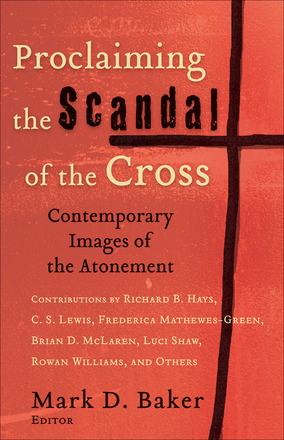Mark D. Baker: Proclaiming the Scandal of the Cross
 Mark D. Baker, ed., Proclaiming the Scandal of the Cross: Contemporary Images of the Atonement (Grand Rapids, MI: Baker Academic, 2006), 208 pages, ISBN 9780801027420.
Mark D. Baker, ed., Proclaiming the Scandal of the Cross: Contemporary Images of the Atonement (Grand Rapids, MI: Baker Academic, 2006), 208 pages, ISBN 9780801027420.
Proclaiming the Scandal of the Cross is principally a supplemental volume to an earlier book entitled Recovering the Scandal of the Cross (2000, second edition 2011), which was co-authored by Joel Green and Mark D. Baker. The earlier volume pointed out several weaknesses with the penal satisfaction model of the atonement, particularly in the thought of nineteenth century theologian Charles Hodge, and Baker hopes to build upon this work. The editor notes many misconceptions of the atonement that are commonly perpetuated within popular Christianity, and he desires to correct these mistaken beliefs. Notably, Baker wants to discredit the idea that penal satisfaction is the only biblical view centered on this theological concept, so he presents a variety of models for consideration. Metaphorically he proposes a “choir” of voices and not just a soloist. Baker is clear to point out that he is not opposed to all forms of the substitutionary model, but he is very cautious about the manner in which the penal satisfaction theory is employed. For him, no single model can fully exhaust the power and mystery of the atonement, and he hopes that the presentation of multiple views can “be a catalyst to advance creative thinking about communicating the atonement” (36).
The bulk of this volume is dedicated to presenting twenty different contemporary theories of the atonement through the words of many diverse contributors. These authors range from well-known authors, such as C.S. Lewis and Rowan Williams to lesser-known pastors. These theological approaches not only vary in content, according to the model that they present, but they also differ in style. Some of them are drawn from larger theological works, while others are taken from sermons, chapel talks, youth group lessons, and autobiographical presentations. Baker is to be commended for the vast assortment of voices that he includes from various branches of the Christian Church, such as Evangelical, Eastern Orthodox, and Anglican. At the beginning of each chapter the editor provides some background information concerning the context from which each model was taken. At the end of each chapter Baker also provides a brief reflection upon each passage, highlighting some of its main features – or at least those features that he wants to emphasize. At several points throughout the reading of this text, however, I was left wanting more reflection and analysis of each theory from the editor.
Overall, Baker’s goal to present a vast array of atonement models and to supplement certain dominant models is commendable. His goal of reaching a popular audience is feasible based upon the manner in which the contents are exhibited, and I could envision this text being used in a college-level classroom or an adult Christian education setting. It would likely evoke some stimulating thought and vibrant conversation. For example, some readers may find the narrative form of many of its chapters to be engaging and comprehensible. Those with higher-levels of theological training, however, may find some of the models, or at least their presentation, to be too simple and lacking the various nuances of each theory. Herein lies one of the challenges that Baker attempts to overcome: the strengths of presenting these models to a popular audience must be weighed against the possible charge that some models have been “watered-down” too much. Consequently, and to build upon his musical metaphor, the text should be viewed as an opening number in this musical concert of atonement theories. It is a number well-worth the price of admission.
Reviewed by David Bradnick
Publisher’s page: http://bakerpublishinggroup.com/books/proclaiming-the-scandal-of-the-cross/230810
Category: Biblical Studies, Summer 2016


